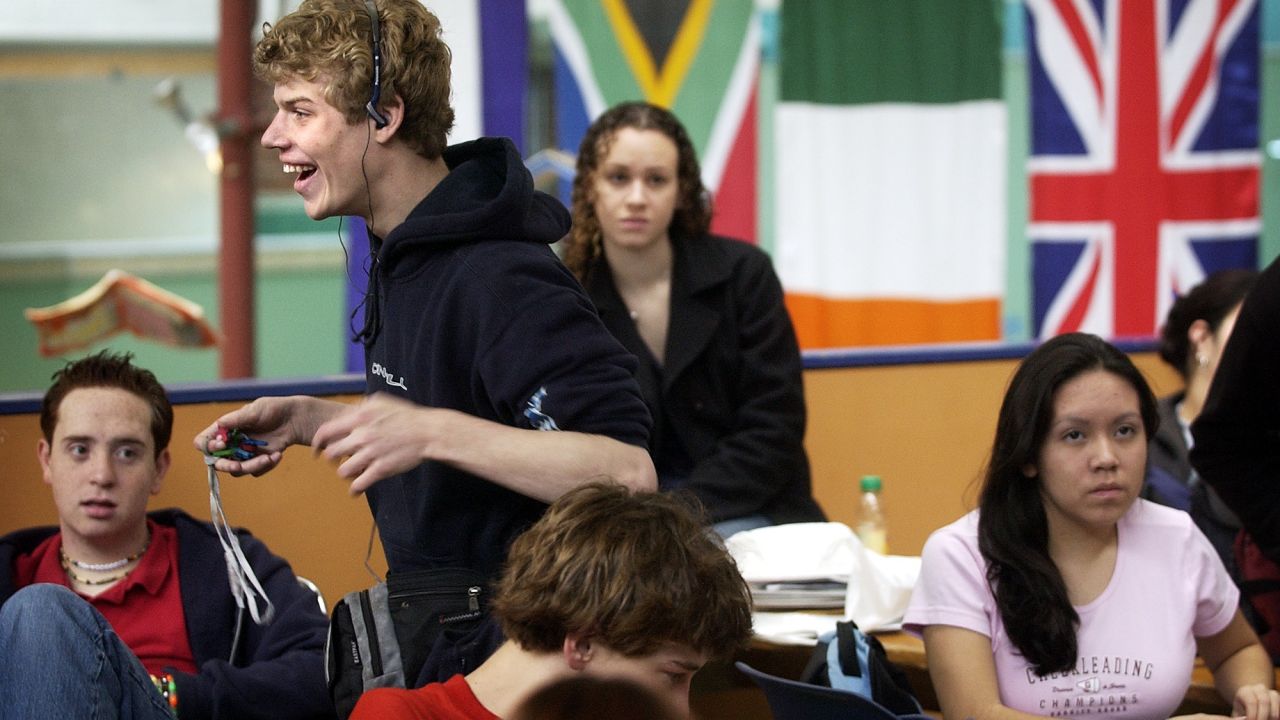
Chris Patton, 19, who is autistic, reacts to music played over a portable stereo while other students listen to teacher Erin Thompson go over assignments and schedules for her advisement class at PS1, a Denver charter school. Chris' father says his son has been better served by being mainstreamed in general classes. (Photo By Glenn Asakawa/The Denver Post via Getty Images)
This post originally appeared at Our Future.
Students with disabilities already face a difficult path through our nation’s education system, but President Donald Trump appears determined to add to the disadvantages these students already face. His nomination of Judge Neil Gorsuch for the Supreme Court is yet another sign his administration is less than eager to uphold the rights of these students.
Just how rough do disabled students already have it?
They score far lower on standardized achievement tests, which have become even more of an emphasis in our accountability-driven education system. They’re more than twice as likely to be suspended from school and they’re much more apt to be bullied at school. They’re less likely to get help in schools, despite legal requirements for schools to provide a free and appropriate education. And while high school graduation rates have hit a record high of 83 percent nationally, graduation rates for these students continue to be mired below 70 percent in 33 states. In seven of those states, the rate is less than 50 percent.
With the Gorsuch nomination, Trump appears increasingly willing to respond to the real obstacles these children face by telling them, “Tough! You’re on your own.”
A vote to approve Gorsuch would be tantamount to saying the same thing.
Luke’s Case
— Marge Baker, People for the American Way
“Gorsuch is a threat to educational equity and the fundamental rights of all Americans,” says Marge Baker, the Executive Vice President for Policy and Program at People for the American Way.
In an email statement, she points to a previous decision in 2008 in which Gorsuch rejected the opinions of lower courts that had ruled an elementary school child with autism had the legal right to a residential school program.
The boy, Luke, faced serious obstacles in navigating day-to-day life, including using the bathroom and navigating public spaces without breaking out into fits of violence. Although the special education program provided by the public schools had helped, it simply wasn’t enough, and Luke’s parents sought financial remuneration from the school district for his extra level of care.
The case required Gorsuch to apply the proper interpretation of the Individuals with Disabilities Act (IDEA), a key federal law guaranteeing students with disabilities access to a free and appropriate education.
He failed to do that.
Doing ‘De Minimus’
Although three lower courts had ruled Luke’s parents, under the provisions of IDEA, were rightfully due financial compensation from the district, Gorsuch reversed those rulings, arguing his own personal precedent that students like Luke only needed to exhibit gains that were “merely more than de minimis” for the school to show it had complied with the law.
“His reasoning in that case was so extreme that it was actually overturned unanimously by the Supreme Court,” Baker explains. Indeed, in recent ruling on a similar case, all eight justices of the court rejected the “merely more than de minimis” progress Gorsuch had attempted to set in interpreting federal disabilities law.
Gorsuch’s use of the words “merely more than de minimis” in his ruling is not the only instance in which he has failed to uphold legal precedent in enforcing federal disabilities laws.
‘A Lack Of Regard’
A review of his previous rulings by the National Education Association finds, “his record, when considered as a whole, shows a lack of regard for the struggles and rights of students with disabilities.”
According to NEA, “Gorsuch has written or participated in several cases about the IDEA,” but he has “sided with a disabled student without expressing his personal reservations in only one case.”
NEA’s review concludes, “Given this record, the hard-won protections for students with disabilities could be in peril should Judge Gorsuch be confirmed to the Supreme Court.”
“Gorsuch has gone out of his way to impose extra legal barriers for students with disabilities rather than helping them to overcome obstacles,” says NEA President Lily Eskelsen Garcia to Scoop, a news outlet covering developmental disability news. “We should all be concerned by this troubling trend in Gorsuch’s record.”
Gorsuch’s tendency to disregard the rights of disabled students reflects the Trump administration’s routine disregard for their needs.
A Pattern Of Neglect
During the presidential campaign, Trump infamously mocked a reporter with a physical disability to an audience at a public rally.
But the first sign the Trump administration posed a unified threat toward these students emerged in hearings for US secretary of education nominee Betsy DeVos.
During her confirmation hearing, when she was asked a question about her views on IDEA, DeVos “displayed at best confusion and at worst a lack of knowledge” about the law, reports Emma Brown of The Washington Post.
When asked repeatedly by Virginia Sen. Tim Kaine whether schools receiving federal funds should uphold federal law in their treatment of students with disabilities, she replied, “I think that is a matter that is best left up to the states.”
When Kaine rightly reminded her IDEA is a federal law and failure to enforce it would force parents into difficult life circumstances if the state they happened to live in didn’t treat their children very well, DeVos made vague mention of a program she liked in Florida that provides parents with a voucher they can use to move to a private school.
The Florida program, Brown notes, “requires students to sign away their IDEA due process rights.”
Indeed, school voucher programs, like the Florida one DeVos champions and Trump appears to favor too, do more harm than good to students with disabilities, in the long run.
An analysis by the left-leaning Center for American Progress finds that these programs aid in transferring public schools funds to private schools that “can deny admission outright to students … if their needs are considered too severe. If schools do choose to admit students with special needs, they are not obligated to provide necessary behavioral and educational interventions and can refuse to continue services at any time.”
The Gorsuch nomination not only continues the pattern of neglect, even antipathy, Trump exhibits toward students with disabilities; his approval would cement this in legal precedent for generations to come.
Gorsuch Should Go Down
In his testimony to senators at Gorsuch’s confirmation hearing, Luke’s father Jeffrey Perkins states, “Judge Gorsuch felt that an education for my son that was even one small step above insignificant was acceptable,” and his ruling on Luke’s case set the dangerous precedent that, “even if a child, as in Luke’s case, was utterly failing to progress in any meaningful global sense, the educational plan would be judged ‘appropriate.’
“Judge Gorsuch eviscerated the educational standard guaranteed by the IDEA,” Perkines concludes. “On behalf of all children — disabled, typical and gifted — I urge you to deny confirmation of Judge Neal Gorsuch to the Supreme Court of the United States.”
Tell your senators you agree.




